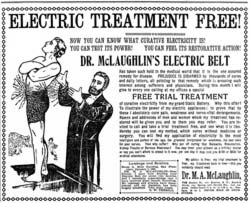Has it really already been a week? Anyway, here’s the second post in our ongoing Ethical Blogging series – this time I’m going to take a look at the idea of monetising websites, and in particular the use of advertisements. This is an area that ALWAYS brings up debate, and indeed our first post on ethical blogging was criticised on one forum for having some Google AdSense within it (as if the presence of Google Ads within a post is, by definition, unethical).
The issue of monetisation will be spread over a few posts. For now, I’m going to look at the use of advertising within a blog and will be highlighting some of the ethical and unethical ways we might go about this – and yes, I’m going to embed ads within the post at some point!
Should blogs be monetised at all?
The first ethical issue we have to tackle is one that often divides bloggers – should a blog be monetised at all? The short answer, from our perspective, is that there is no ethical issue with monetising your hard work…as long as you do so in an open and forthright manner.
There are some further caveats to this idea, which I will be going into further below, but I just wanted to get that out of the way. For all those bloggers who think it is by definition unethical to monetise, by all means don’t do it yourselves – but to look down upon others for wanting to do so is just unfounded arrogance (besides, most of those who say ‘NO ADS!’ will often also be the ones with speaking engagements to sell, lecture circuits to highlight, books to promote, etc).
Ethical practices for online advertisements
So now that we’ve established that placing advertising on your site is an acceptable practice (at least within the vision of this series), there are some ground rules to doing so that should be observed:
1) Always follow the terms and conditions of the advertising network you are using. This one speaks for itself really (and indeed even unethical bloggers will try and meet these conditions to ensure that they get paid!), but it’s worth trying to see the spirit of the rules – rather than just looking for loopholes to exploit. This also covers all of the click-fraud type practices that you might think you can get away with.
2) The placement of advertisements should not impede on the general aesthetic of your site. There is no hard and fast rule, but if you have more than about 20% of each screen filled with advertisements I would suggest you are crossing the line. Not only does this make your site look ugly, but it really does show a lack of respect for your content and your readers.
3) Ads should be clearly visible as such. There should be no attempt to trick people into clicking your ads (by making them look like menu options for example). If you are following the terms and conditions in step 1 then much of this step will already be taken care of, but it is worth mentioning again. Of course, this does not mean that you should not experiment with placement of your ads to increase visibility/relevance. All it means is that you should be above board with your advertisements and not attempt to deceive anybody.
4) You should try and make your ads as relevant as possible. In other words, advertisements should serve your readers – they should be an advantage (pun intended!). This can be a difficult task, and with contextual programmes it is an ongoing battle. Luckily there are usually tools provided for you (such as the ability to blanket veto particular categories), and you should be adding as many irrelevant or offensive ads to the blocked list as possible.
When you are providing ad placements for sale, your criteria for selection should be even more rigorous than contextual ads – because you now have complete control over who can promote themselves through your website. The general rule should be: would my readers be interested in, or benefit from, this? If the answer is no, the advertising should go.
5) Advertisements should not effect your content. This basically means that you shouldn’t break up content with a row of advertisements, always maintain the flow of your content and make sure that it is easy to read and understand. If your advertising blocks are too big, wide, or distracting then your content is what suffers. People don’t visit websites to see the ads, they visit for the content – always keep content the number one priority and you can’t go too far wrong.
Ethical pitfalls to avoid
So now that we’ve seen some basic criteria for ethical placement and selection of advertisements, let’s now look at some obvious unethical – or just plain irritating – practices. Note that some of these are highly effective ways to produce an income, however you will notice that they tend to break some of the guidelines above. Having said that, here are five things to avoid when using advertising on your website:
1) Don’t use the maximum number of ads on your page ‘just because you can’. This applies to programmes such as Google AdSense, which allows you to use a certain number of its ads, but also remember this rule in conjunction with any other form of advertising you may use alongside it. Bottom line: too many advertisements will work against your site and make it less appealing to your visitors.
2) Popup ads and those that cover your content via a roll-over effect are generally a bad idea. There are always exceptions to this rule – particularly if the ads you display are customised for your site and offer your visitors unique deals – but the majority of the time such tactics are just irritating. Popup ads make your site seem spammy, and roll-over ads can often be very distracting. This problem is compounded when such ads are difficult to get rid of, the close button is too small or they are deceptive in other ways (for example, a ‘cancel’ button is actually part of the ad).
3) Don’t send your visitors to dangerous or unethical sites. In many ways, you will be judged by the company that you keep and when you send your visitors to pages that are inherently unethical it reflects badly upon your own site. This is another area where contextual ads can be difficult to manage, and is an area that needs a lot of attention paid to it.
4) Don’t create content just to receive the highest paying ads. This one links in to what we discussed in the last post on ethical blogging. There is often a temptation to cover the highest paying keywords for contextual ads, or to just always go with the highest bidders for private ads. In the first case, you will suffer from your blog seeming like a cookie-cutter site where your passion lies in profit not knowledge; and the second means that you might overlook some very worthwhile causes or companies simply because they cannot spend as much as some of the online money-spinners.
5) Last, but by no means least (and please do leave any others you think of in the comments!), listen to your visitors. I’ve put this one at the end because it really is the bottom line. Ethical behaviour – particularly in the world of blogging – depends a great deal on the needs and wants of your readers. Not only does this mean that you will create a sense of community and loyalty, but in the end it actually means your monetisation efforts will probably be more successful! Your readers are the last word when it comes to advertising. If enough of them are vocal about not liking something, then make sure you listen.
Conclusion
Clearly I couldn’t cover everything here, but hopefully I’ve given you an idea of how to use advertising on your blog in an ethical manner. By following these guidelines you will create a more appealing and attractive blog that will keep your readers coming back for more.
Finally, I just want to highlight that a large motivation for writing this series is the massive boom that blogging has seen over the past five years. As many new people begin to explore this new ability to have their voice heard there are also many temptations to make a quick buck (unethical behaviour on blogs is almost always about money…although there are other areas we’ll be getting into in later posts). Blogging truly is a privilege – the opportunity to have your opinion heard by thousands of others should not be taken lightly.
Hopefully you’ve enjoyed this latest post on ethical blogging, do tune in next week for the next one. As always, we’d love to hear your thoughts on anything to do with the ethics of advertising on blogs. You’re definitely allowed to disagree with what I am saying! If you think differently, please let us know!
[ad name=”Google Adsense-Link Banner x4″]






